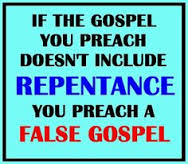Every year I go through the exercise of trying to explain to people why we celebrate Advent and don’t jump into Christmas after Halloween. It has been an upward battle and I am starting to realize why. Advent is about repentance and faith. Jesus gathered the church for a specific purpose and that was so “repentance and faith would be preached in His name” (Luke 24;47) to all nations. Jesus says that repentance is a missionary imperative. He came as the messenger of the covenant of Grace and that is based upon repentance and faith. It is no wonder the church struggles in a society that will not recognize sin. What is there to repent of except maybe some political correctness, homophobia, serving tacos on a college campus, or talking about “hard work”.
Here is what one the old professors of the LCMS wrote –
Throughout the Old and New Testaments we see Him who in the Old Testament is so often called the Angel of the Lord setting forth on His mission of mercy to make men partakers of the covenant established by Him. For this purpose He calls sinners to repentance. Appearing to Hagar, the runaway maid of
Sarah, He tells her of her sin: “Hagar, Sarai’s maid, whence comest thou, and whither wilt thou go 1” Gen. 16, 8. Apostate Israel is rebuked for its faithlessness, Judg. 2, 1 ff. Self-righteous Nicodemus is told: , John 3, 3, and bigoted Saul must hear: Acts 9, 4. 5. When sinners stand repentant before Him, their heads bowed down in shame, their hearts heavy with consciousness of sin and guilt, then He, the Messenger of the Oovenant of Grace, gives them of His fulness and grace for grace, Zech. 3, 1-5. The same promise of forgiveness and pardon is given to wayward, erring Hagar, filling her heart with peace and comfort. “Thou, God, seest me,” so she exclaims and returns to her home rejoicing, assured of the favor of her God. And whosoever comes to Him, whether it is a Nicodemus, blameless before men, or a publican and sinner; whether they are little children, brought to Him in infancy or early youth, or hardened criminals, who, like the thief on the cross, turn to Him in the last hour -for all He has that selfsame message of pardon and peace: “Him that cometh to Me I will in no wise cast out. Be of good cheer, thy sins be forgiven
thee. Depart in peace.” The Messenger of the Covenant is also our gracious Friend and Helper in all bodily ills and woes. To weary Hagar and Ishmael dying of thirst in the wilderness; to Jacob fleeing from the wrath of his brother; to Israel groaning in sl avery in Egypt; to Joshua facing Jericho with its seemingly
impregnable walls; to hundreds and thousands who came to Him applying for His help while He walked the soil of Palestine; to all those millions who since that time have called upon His holy name, -to all, to each and everyone of them, He has proved Himself the Messenger of the Covenant of Grace, graciously hearing their prayer, graciously aiding them with His advice, His comfort, His almighty power; freeing
them from their woe or giving them strength to carry their cross willingly or filling their hearts and souls with His wonderful peace, standing ever at their side, never for a moment leaving or forsaking them, finally delivering them from all evil, and graciously taking them from this vale of tears to Himself in heaven.
Theodore Laetsch


